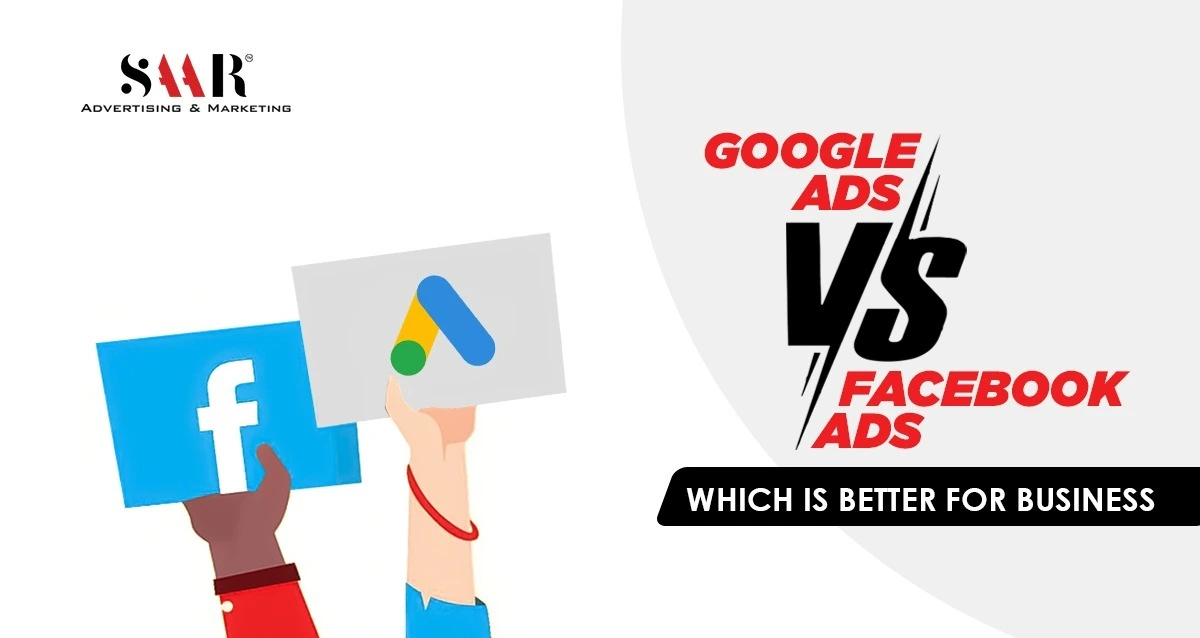
Google Ads vs Facebook Ads Which Is Better for Business
Published on: December 20, 2023
In the ever-evolving landscape of digital marketing, choosing the right advertising platform is crucial for the success of your business.
Google Ads and Facebook Ads are the two giants in the online advertising realm. Each platform has its strengths and weaknesses and understanding the subtle differences can significantly impact your marketing strategy.
Thus in today’s blog post, we’ll explore the key features of Facebook Ads vs Google Ads to help you make an informed decision for your business.
Google Ads: Reaching Intent-Driven Audiences
• Search Intent
Google Ads primarily operate on the concept of search intent that is when users enter keywords into the Google search bar, they are expressing a specific intent.
Google Ads allows businesses to display their ads to users actively searching for products or services thus making it a powerful tool for capturing high-intent leads.
• Targeting Options
Google Ads offers precise targeting options based on keywords, location, demographics and device type. This granular targeting ensures that your ads reach a highly relevant audience.
• Bidding
Google Ads allows you to bid for your advertisements in a variety of ways, based on what is most important to you and your business. The majority of advertisers are concerned about clicks, impressions, conversions, or views (for video advertisements).
Knowing what you want your advertising to accomplish can assist you in determining how to bid. With cost-per-action (CPA) or cost-per-click (CPC) bidding, you only have to pay when someone clicks through from your ad to your website.
CPV bidding, on the other hand, allows you to pay for video views as well as additional video engagements such as clicks on calls-to-action overlays (CTAs), cards, and companion banners.
• Ad Formats
Google Ads supports various ad formats including text ads, display ads and video ads. This adaptability enables marketers to select the format that best matches their marketing objectives.
Facebook Ads: Leveraging Social Connectivity
• Audience Targeting
Facebook Ads capitalize on the vast amount of user data collected by the platform. Advertisers may target certain demographics, interests, habits and even bespoke audiences.
This makes Facebook a powerful tool for reaching a specific demographic or creating brand awareness.
• Visual Appeal
Facebook is a visual platform and its ad formats include images, carousels, videos and slideshows. This visual appeal can significantly enhance brand visibility and engagement.
• Social Engagement
Unlike Google Ads, Facebook Ads allow for direct interaction with users through comments, likes and shares. This social engagement can contribute to building a community around your brand.
• Cost Structure
Facebook Ads are often priced per impression or per click. Advertisers can select the most appropriate pricing model based on their marketing objectives.
Choosing the Right Platform
The decision between Facebook Ads vs Google Ads ultimately depends on your business goals, target audience and advertising objectives.
If your primary focus is capturing high-intent users actively searching for products or services, Google Ads may be the better choice.
On the other hand, if you aim to build brand awareness, engage with a broader audience or leverage visually appealing content, Facebook Ads might be the preferred option.
All in all, a well-rounded digital marketing strategy may include a mix of both Google Ads and Facebook Ads and by understanding the strengths of each platform and aligning them with your business objectives, you can create a complete advertising strategy that maximizes your online presence and drives results
FAQs
Why is Google Ads better?
Google Ads is a powerful platform that dominates search engine advertising. Here are some reasons why Google Ads is often considered superior:
• Google Ads focuses on visitors who are actively looking for certain products or services. This intent-driven approach ensures that your ads are presented to an audience already interested in what you offer thus increasing the likelihood of conversions.
• With Google Ads, you can target specific keywords relevant to your business; this level of specificity lets you design ads to show in search results when customers are looking for items or services in your industry.
• Google processes billions of searches daily, providing a vast reach for your ads. This expansive network ensures your business can tap into a diverse audience across different industries and demographics.
Which ads are most effective?
• If your business relies on capturing high-intent leads actively searching for your products or services, Google Ads is the preferred choice. Examples include service providers, local businesses and e-commerce stores.
• If your business is looking to build brand awareness and engage with a broader audience, Facebook Ads is the preferred choice.
Is Google Ads really profitable?
Yes, Google Ads are really profitable. In fact, according to Google, every dollar spent on advertising generates $8 in profit. This means that, based on their estimates, their advertising platform generates an 8:1 return on investment.

